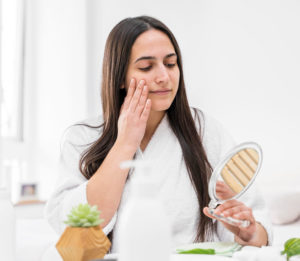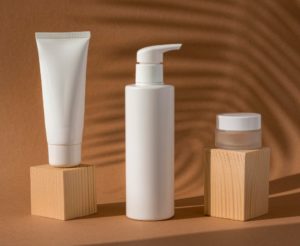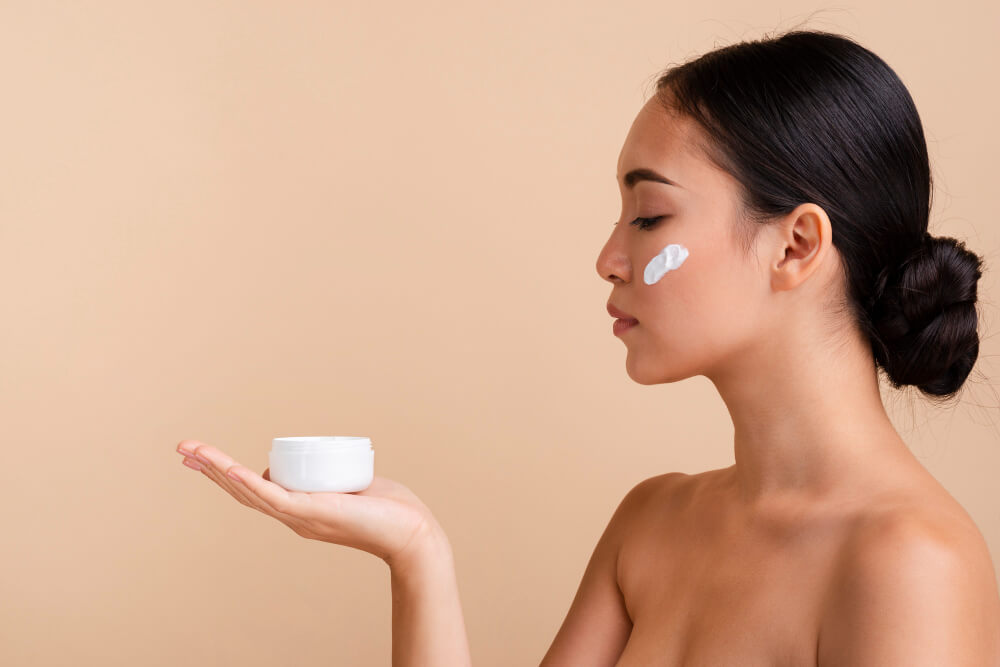There are dozens of different components and formulations in the field of skincare. Silicone is one of the most common and contentious skincare chemicals on the market. Many people associate the word at the head of an ingredient list with something strange, chemical, and possibly even harmful at least, that appears to be the consensus after a quick poll among friends and other beauty enthusiasts.
Silicone – What is it and Why is it used in Skincare?
Silicone is derived from the natural molecule “silica,” which undergoes a chemical procedure before becoming a skincare ingredient. Silicone is typically composed of carbon, oxygen, and hydrogen
Manufacturers frequently list silicone under a different name. To determine whether a skin care product contains silicone, look for ingredient names that finish in “cone.” Here are several examples:
- dimethicone
- Cyclopentasiloxane and cyclomethicone are two examples of polymers.
- Methicone cetearyl
Benefits Of Silicone in Skincare

1. Elasticity of the Skin
According to a 2016 study, silicon is beneficial for stimulating fibroblasts — the major cell of active tissue — and collagen formation, which improves skin elasticity and strength. Other products with a high silicone concentration also benefit the hair and nails.
2. Reduction in Scarring
A 2016 study looked into the topical application of silicone for scarring. 205 of the 224 participants had hypertrophic scars, which are elevated scarring localized to the damaged area, and 19 had keloid scars, scar tissue that forms a benign tumor in any place of the body.
For 1-16 months, participants received topical therapy with a silicone patch. Silicone enhanced the thickness, color, and suppleness of both types of scars, according to the findings.
3. Promotes Hydration
Silicone also helps to minimize transepidermal water loss. This implies that it forms a barrier on the skin, preventing water loss and trapping moisture. Preventing water loss aids in the promotion of skin hydrated.
4. Even Texture
Silicone also helps the skin’s smoothness, suppleness, and adaptability. Moisturizers are often used to minimize fine wrinkles, giving the skin a smoother texture.
Are Silicones in Skincare actually Safe?
Most people can safely use silicone. Silicon in skin care products such as moisturizers and patches, according to the Cosmetic Component Review Expert Panel, is safe. Silicones, such as dimethicone, have no interaction with the epidermis, the skin’s upper layer, and are hence unlikely to breach the skin barrier.
Silicone does not appear to be detrimental to the majority of people. People with acne, on the other hand, should consult with their doctor or dermatologist before using it to assess the danger of clogging pores with certain products or chemicals.
“PFAS (Per- and Polyfluoroalkyl Substances) in cosmetics have raised concerns due to their potential health impacts. These substances, known for their water and grease-resistant properties, are used in some cosmetics to enhance product performance.
However, studies suggest that prolonged exposure to PFAS through cosmetics may pose health risks, including hormonal disruptions, immune system effects, and potential links to certain cancers. Absorption through the skin raises worries about their accumulation in the body over time.
Are There Any Alternatives to Silicone in Skincare?
Other products that trap in moisture and increase skin hydration are available. Alternatives to silicone-containing goods include:

Ceramides:
Ceramide-containing skincare creams and lotions are also an alternative. Ceramides are fatty acids that trap moisture in the outermost layer of skin and reduce dryness.
Essential oils:
Various essential oils can help smooth fine lines and address skin concerns including dryness and inflammation. One example is lavender oil.
Hyaluronic acid:
According to a 2021 study, the molecular weight of hyaluronic acid enhances its diffusion into the skin. It hydrates and has anti-aging properties.
In summary
Silicone begins as a naturally occurring chemical known as “silica”. This chemical, however, goes through a specialized process to produce the silicone found in skincare products. moisturizers, lotions, and patches are examples of silicone-containing products.
Silicone for skin application can help with wound healing, retention of moisture, and skin smoothing. Most people are safe to use silicone, but if they have any worries, they should visit a dermatologist to determine the best product for their skin type.
Silicone in Skincare FAQs-
Silicone can block pores and/or cause acne.
No, silicone is not directly responsible for clogged pores or acne. However, because silicone is occlusive, if it is not thoroughly washed off, it can develop a build-up on the skin, clogging pores and contributing to acne.
How can you know if a skin care product contains silicone as an ingredient?
It's not often that the word "silicone" is simply listed in the tiny print. Instead, seek for words that finish in "ane" or "one," which Svendsen says usually allude to a silicone derivative.
Can silicone cause allergic reactions?
Itching, burning, redness, hives, swelling, can be the allergic reactions seen due to using cosmetic products containing silicone.
What essential oil can I use instead of silicone?
Lavender oil is the best alternative that can help even out fine lines and wrinkles without causing any side effects.

